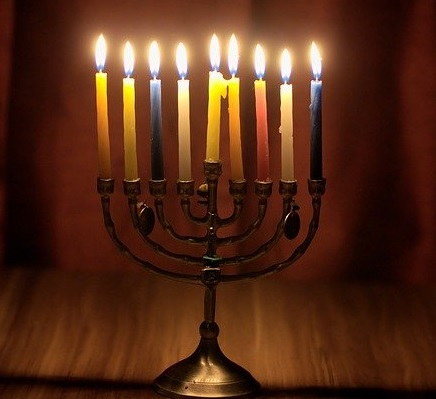April 15, 2006.
The modernization of Israel was going well. Sacrifices to Jehovah in His temple had been totally halted. Circumcision and Sabbath-keeping were being extinguished. Copies of Scriptures found were burned. Grecian beliefs and customs were taking over. The Syrian Antiochus Epiphanes was accomplishing his pagan goals.
However, not all Israelites gave in to these politically-correct pressures. Among the valiant resistors was the priest Mattathias, who like Moses fleeing Egypt, fled to the mountains with his sons. Others joined them, and they began raids to tear down pagan altars. When Mattathias neared death, he appointed his son Judas Maccabeus to be the captain of the rebels. As they battled the heathen in Israel as well as external enemies, they increased in power and renown. Antiochus sent armies against them, but Judas’ men fasted and prayed to God for their righteous cause. Over time, the valiant men of Israel prevailed.
Finally, Judas and his men reached Jerusalem. Upon seeing the desolation, the profaned altar, the gates burned, and shrubs growing in the courts, they made a great lamentation, rending their clothes and casting ashes on their heads. They proceeded to cleanse the entire area, built a new clean altar, made new holy vessels, and put the lampstand, table, and altar of incense into their rightful places. On the 25th of their month Kislev, in the year 165 B.C. they celebrated the cleansing of the temple and dedicated it anew to the living God, with great rejoicing.
Thus was fulfilled that which was spoken through Daniel the prophet, “then shall the sanctuary be cleansed” (8:14). Thus originated the feast of Hanukkah (which means “dedication”), and which the Jews celebrated in Jesus’ day (John 10:22-23) and until this day, every December. (You can read the history in 1 Maccabees, chapters 1-6 and 2 Maccabees, chapters 3-10.)
Grecian paganism, under Antiochus Epiphanes, attempted to blot out the true worship of almighty God. But God had other plans. God had chosen the children of Israel in order to bring the Messiah into the world. God had chosen Jerusalem, not only as the place for the symbolic animal sacrifices to be offered, but also as the place where the true Lamb of God would be offered. No pagan tyrant was strong enough to withstand God. The temple, the Jewish people, and Jerusalem had to all be preserved together until the glorious arrival of the King of the Jews. The situation later on in A.D. 70, after Messiah had come, would be a very different story; but in 165 B.C. the temple had to be cleansed for God to fulfill His plans. Daniel had predicted it. God fulfilled it.
